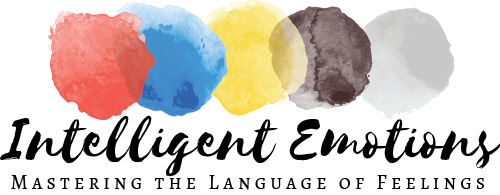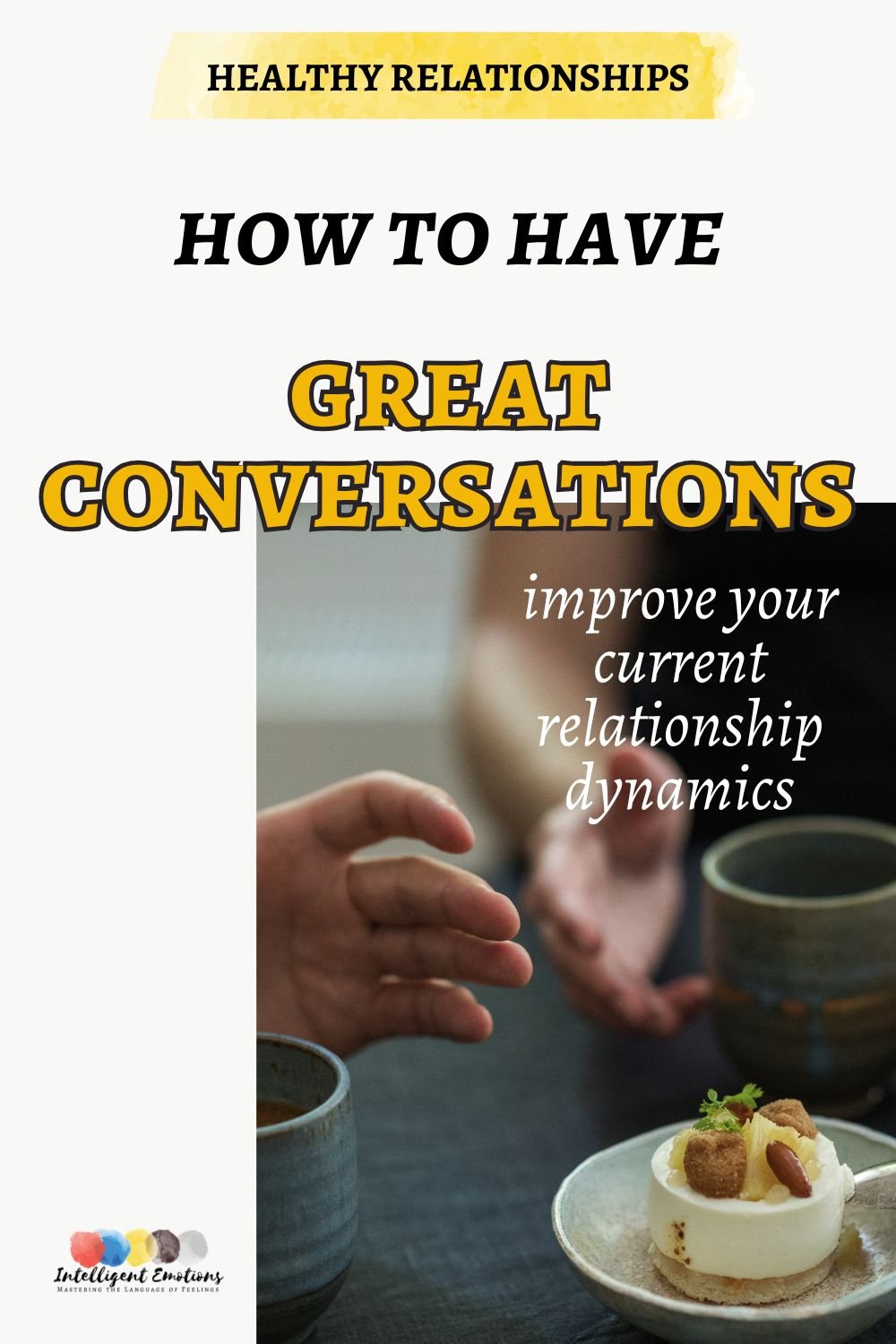How to Have Great Conversations
Much like rallying in tennis, knowing how to have great conversations is about the rhythm of give and take. One person can’t do all the work—building healthy relationships depends on BOTH people staying engaged, taking turns, and keeping the energy flowing.
When you learn to improve relationships with conversations that feel natural and effortless, deeper connections follow.
But here’s the thing: how you “serve” or “hit” the conversational ball makes a huge difference.
Some approaches keep things moving, while others? They lead to awkward pauses, dead ends, or even a total shutdown.
The way you ask questions can either invite more conversation or stop it in its tracks.
So, what makes for better conversations?
It all comes down to the Journalistic Six Questions, AKA the six “WH” questions:
WHO
WHAT
WHEN
WHERE
WHY
HOW
These classic WH-questions are designed to gather information and keep a dialogue going. But not all of them are created equal.
🔴 ONE is a bomb that blows up the convo with collateral damage,
🟡 THREE/FOUR tend to fizzle out quickly, and
🟢 TWO are gems that lead to greater intimacy and better connection.
So, which one is which?
WHO, WHEN, WHERE: The Fast Track to Nowhere
The questions WHO, WHEN, and WHERE fall into the category of closed questions—aka, conversation DEAD ENDS.
Once the other person answers, that’s it. No natural flow, no momentum. If you want the conversation to continue, you’re left scrambling for the next question.
The three questions, WHO, WHEN, and WHERE are what’s called CLOSED questions: once the other party answers the question, the conversation’s done and you’re basically stuck with needing to ask another question if you want it to continue.
Need some examples?
WHO - Who did you have lunch with the other day?
WHEN - When was your doctor’s appointment?
WHERE - Where are you from?
And sometimes WHAT sneaks into the mix, making things even more stale:
WHAT - What’s your major?* What do you do?*
*FYI, these are the MOST BORING questions in college and post-grad conversations. If you want to make a lasting impression, maybe don’t lead with the most predictable question ever.
Now, don’t get me wrong—these questions can be useful in certain moments.
But if you lean on them too much, the conversation goes dry real fast. Your convo partner might answer politely, but they’re probably just waiting for their turn to throw the same basic questions back at you.
*Cue awkward silence*
WHY: The Conversational NUKE to AVOID
One of the most common questions people ask is also one of the most dangerous.
WHY is meant to uncover someone’s reasoning or intentions, but instead, it often sends the conversation spiraling in an unexpected (and sometimes uncomfortable) direction. I like to say that the convo explodes, leaving a trail of dead bodies in its wake.
WHY does this happen? (See what I did there?)
It’s not because the question itself is bad.
The problem is the way it often lands—whether intentional or not, WHY questions can come across as interrogations, putting the other person on the defensive.
Think about how these sound:
Why did you go to the store?
Why did you call me?
Why did you choose your major?
Why do you like chocolate chip cookies?
Even totally innocent WHY questions can feel pointed when you’re on the receiving end.
That’s because we don’t just process what someone says—we process how they say it first.
Our brains are wired to pick up on tone, body language, and facial expressions before we even fully register the words being spoken.
This happens because our feeling brain (which processes relationships) works WAY FASTER than our thinking brain (which processes logic and content).
So if you’re tossing out WHY questions, don’t be surprised if the other person gets a little defensive! When someone hears “why”, they often feel like they need to justify their answer, almost as if they’re being put on trial.
It’s as if the answerer needs to provide a “legitimate” response or justification, which can be really painful for those who already struggle with low self-esteem. (And who gets to determine what’s legitimate?)
💡If you find yourself or others getting defensive in conversations, it might help to focus on self-regulation. Here are 5 Ways to Process Your Feelings when conversations feel overwhelming.
WHY KILLS Connection
Here’s the real problem: defensiveness is one of the Four Horsemen of the Apocalypse that signals the end times of a relationship.
If someone is constantly feeling defensive, it puts a major strain on connection and trust.
But if people around you frequently get defensive when you ask questions, it might not be about them—it might be about how you’re asking.
WHYs are TERRIBLE questions for cultivating relationships, which ought to be built on safety, trust, and closeness.
At its core, WHY creates an unintentional power imbalance:
The asker (accidentally) takes a one-UP position (the interrogator).
The listener (accidentally) takes a one-DOWN position (the accused).
Rapport is hard to build when there’s an inherent power dynamic - one person being ABOVE/UNDER the other - because it’s as if there’s one winner and one loser.
When that dynamic sneaks into a conversation, it turns connection into competition. And competition or comparison is NOT a great setup for intimacy.
HOW & WHAT ABOUT: The Magical Questions
You might genuinely want to understand why someone made a certain choice—their reasoning, values, or personal experiences.
After all, these deeper insights are what build real intimacy.
But because these things are personal (and thus more vulnerable), the way you approach them matters. The goal isn’t to FORCE someone into opening up—it’s to CREATE SPACE where they feel safe enough to share.
Building connection isn’t about DEMANDING trust—it’s about being trustworthy.
The way you ask questions can signal to the other person that their opinions, thoughts, and interests matter. That they matter.
📕 Read more about Radical Candor, a relationship stance that creates room in the relationship big enough for both yourself and others.
Instead of putting them on the spot or making them feel judged, you’re showing that you genuinely want to understand them, on their own terms and timing.
That’s where HOW and WHAT ABOUT come in.
Unlike closed or leading questions, these two open the door for meaningful conversation because you have no clue what the person’s answer might be.
You’re not assuming, labeling, or subtly suggesting what’s “right” or “wrong.” Instead, you’re making them the expert of their own experience, while you take the role of the learner.
By stepping into a one-DOWN position, you’re shifting the dynamic.
You’re letting them know that their answer matters, that it carries weight, and that you’re here to listen, not to judge or correct. Instead of steering the conversation with your own assumptions, you’re giving them full authority over their own story.
Fortunately, WHY questions could easily be converted into HOW and WHAT ABOUT. These two also keep questions OPEN (rather than closed), so they keep the convo going in a much more interesting way.
An example:
Let’s go with the BORINGEST question: “What’s your major?“
If you stop there, the conversation is probably going nowhere fast.
Now, let’s say you try to follow up with WHY—as in, “Why did you choose your major?”
This might be fine, but it could also put the other person on the spot, make them second-guess their answer, or just make things feel a little more intense than necessary.
Alternatively, if you were to follow this up with:
HOW (“How did you come to decide your major?”) or
WHAT ABOUT (“What about your major do you enjoy?),
See the difference? These questions feel more curious, open, and inviting, which makes the other person more likely to actually open up.
Instead of feeling like they have to justify their choice, they get to share their experience in a way that feels natural and comfortable. Feeling seen, known, and understood, the listener would likely move TOWARDS you (vs. AWAY FROM or AGAINST).
Here’s the template on how to use these two questions:
HOW did you ______?
WHAT ABOUT (topic) do you (emotion)?
Almost any closed question can be followed up with one of these to keep things flowing—without the risk of putting someone on the spot or accidentally making them feel like they need to prove something.
“What about key lime pie do you enjoy?” is literally asking the same thing as “Why do you like key lime pie?”, but because the listener’s brain is hearing a softer, welcoming tone, they are likely to remain calm, connected, and open.
💡 Just like our social circles shift over time, the way we communicate influences how close or distant we feel in our relationships. If you haven’t already, check out Concentric Circles of Connection to audit how your social world is structured.
Keep the Rally Going
To sum it all up, here’s how the six journalistic questions stack up:
🔴 The Nuke Question: WHY (approach with caution—it can shut things down fast)
🟡 The Closed Questions: WHO, WHEN, WHERE, (WHAT) (useful sometimes, but often lead to dead ends)
🟢 The Inviting Questions: HOW & WHAT ABOUT (keep conversations flowing and build deeper connections)
At the end of the day, better conversations come from respect, safety, and an open invitation to share.
Try playing around with these six questions in your own conversations and notice what happens—do they help you move TOWARDS each other, create distance (AWAY FROM), or even lead to resistance (AGAINST) each other?
The secret of having great conversations isn’t about having all the right answers—it’s about asking the kinds of questions that make people want to keep talking.
Share it with others who might need it.
The BIG Feelings First Aid Kit
Messy feelings spilling out at the WRONG TIME, WRONG PLACE, WRONG WAY?
Grab this free PDF guide that shows you how to handle feelings like a pro so that you can keep moving forward in life!
Other Blogs on Healthy Relationships
© Copyright 2024 Joanne Kim. All rights reserved.
Joanne Kim, Feelings Translator
Hi! I’m a therapist-turned feelings coach who helps Highly Sensitive Persons, Empaths, Enneagram 2s & 4s, etc. turn their BIGGEST feelings into their GREATEST superpower!
They are often the first (or only) person in their family to intuitively process and express feelings; consequently, they are often judged or criticized so that they learn to people please, placate, or perform until they hit a wall.
They’re super familiar with anxiety, guilt, and shame, partly because of an allergic reaction to anger (theirs and others').
Often the super responsible, empathic, and ethical person in their environments, they reach out to me after they're already burned out, resentful in their relationships, or sucked into their shame spiral.
The most common feedback I get from people when I share about how feelings work is,
"Why didn't anyone teach me this in school??"
Hence, I am building a school helping people work WITH their feelings so their feelings work FOR them.



































You may feel sometimes like you’re going in circles - expending so much energy, time, and resources to change, only to find yourself in the same place all over again. As more time goes on, you feel like the future is bleak - what’s the point of trying, if it’s going to be the same? Perhaps what’s the issue is not what’s happening but how you perceive what’s happening. What if you ARE actually changing?